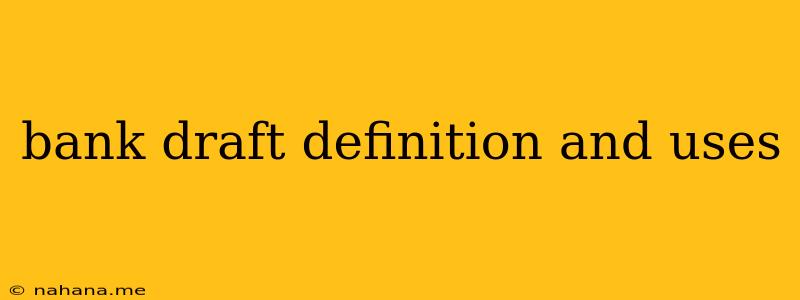What is a Bank Draft?
A bank draft is a financial instrument that is a guaranteed payment method used by individuals and businesses. It is essentially a check drawn on a bank's own funds, making it a safe and reliable way to transfer money. Think of it as a certified check from a bank.
How Does a Bank Draft Work?
- Application: You apply for a bank draft at your bank, providing the necessary details like the payee's name, the amount, and the purpose of the transaction.
- Payment: You pay the bank the amount of the draft plus a small fee.
- Issuance: The bank issues a check drawn on its own account, which is payable to the payee you specified.
- Payment: The payee can then present the draft to their bank for payment.
Uses of a Bank Draft
Bank drafts are used in various scenarios, including:
- Large Transactions: They are often used for significant transactions, such as purchasing real estate or paying for a car.
- International Payments: They can be used for international transactions as they are accepted globally.
- Trusted Payment Method: Bank drafts provide peace of mind for both the payer and the payee, ensuring the funds are available and secure.
- Escrow Services: Real estate transactions often use bank drafts as a secure way to hold funds until the completion of the transaction.
- Business Transactions: Businesses may use bank drafts for making large payments to suppliers or for other business needs.
Advantages of Using a Bank Draft
- Guaranteed Payment: A bank draft is backed by the issuing bank's funds, guaranteeing payment.
- Secure and Reliable: It's a safer option than sending cash or personal checks.
- Widely Accepted: Bank drafts are accepted globally, making them suitable for international transactions.
- Convenient: They are relatively easy to obtain from most banks.
Disadvantages of Using a Bank Draft
- Fees: There is typically a fee associated with obtaining a bank draft.
- Limited Availability: Not all banks offer bank drafts.
- Processing Time: It may take a few days to obtain a bank draft.
Alternatives to Bank Drafts
Alternatives to bank drafts include:
- Wire Transfers: A quick and secure method for transferring funds electronically.
- Certified Checks: Checks guaranteed by the issuing bank.
- Money Orders: Pre-printed checks purchased at a bank or post office.
Conclusion
A bank draft is a reliable and secure way to make payments, especially for significant transactions. It's a valuable financial instrument that offers peace of mind for both the payer and the payee. However, it's crucial to consider the fees and processing time before opting for a bank draft.
